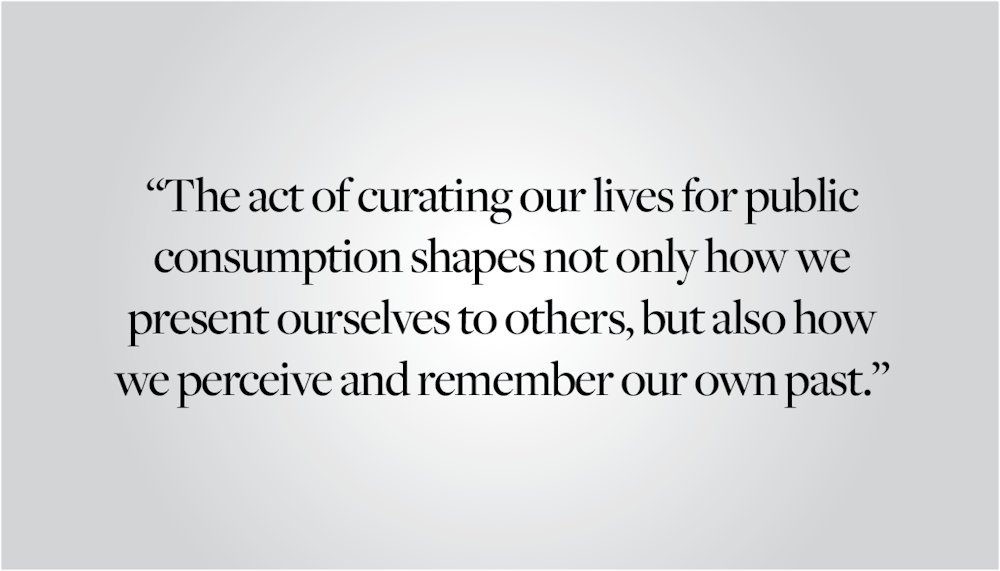In a recent New York Times Magazine interview, Professor of Psychology and Neuroscience Charan Ranganath explains how memories are far more complicated than a chronological record of past experiences. He claims that “we update our memories through the act of remembering,” creating a biased sense of self that is controlled by present ruminations on the past. Some memories seem more memorable than others depending on how profoundly that moment impacted us or how often we revisit it in our minds. Personal identity, then, is constantly changing due to this fluidity of memory recall — both good and bad memories come together to make us who we are.
But what happens to our brains when we scroll through our Instagram feed? As an image or video flashes by, the mind subconsciously absorbs important details: the person’s username, what they’re up to, who they are with and how much more fun they’re having than you. Each frame seems to capture a spontaneous moment in another person’s life, but these have actually been carefully selected for their followers. These fleeting glimpses into the lives of others challenge the traditional method of memory formation and retention. Usually, the brain selects which freeze-frames out of the full motion picture of our lives we end up remembering. However, in today’s online world, Instagram allows people to cherry-pick which memories to showcase to their peers. Never mind that they all happen to be fabulous. It is very easy to feel that other people’s lives are better than yours or to feel alone in your personal struggles. To counter these dangers, consumers and producers of social media must shield their memory formation and be cautious not to view online identities as a true reflection of themselves or the people around them.
The impact of social media on memory is not limited to the content we consume, but extends to sharing our own experiences. The act of curating our lives for public consumption shapes not only how we present ourselves to others, but also how we perceive and remember our own past. A lot of our lives are devoted to recording as many experiences as possible with our phones so we can post them later. Do we end up only remembering these photo-worthy experiences? Or are we so intrinsically tied to our online identities that we start choosing to partake in experiences based on where we can take the coolest photos?
The desire to perfect an online presence can also influence decision-making. Oftentimes, we fear judgment and prioritize how we are perceived over our personal needs and realities. For instance, Instagram itself encourages users to post their “highlights,” like vacation photos or a fun night out with friends. This lack of authenticity in one’s online presence may hide difficulties such as loneliness, financial struggles or unsuccessful relationships. The pressure to showcase an airbrushed version of reality can distort our self-perception and put even more pressure on the suggestible memories we build our identities on.
While humans may have always obsessed over our own good and bad memories, now we also have access to our peers’ highly curated, almost exclusively good experiences. This creates unhealthy insecurities and a culture of comparison. In reality, life is full of imperfections and hardships. People used to value sharing these complicated experiences with their closest friends, which made human connection individualized, genuine and meaningful. Now, with one generalized story or post, people can update everyone from their immediate family to mere acquaintances on major life events, hobbies and friendships in a way that is undeniably shallow. Individuals are discouraged from reaching out to their peers to check in, reconnect or ask for support because that information has already been made widely available.
A cycle of increased connectivity online and increased isolation in the real world can harm relationships and memories and ultimately alter the makeup of one’s own personal history. We must remain aware of the psychological impacts that social media can have on the very human way we live and experience life. All who participate in social media must strive to engage in other more holistic channels of communication. Since the human experience is rich with emotional dimension, our memories should reflect this superabundance of experiences.





